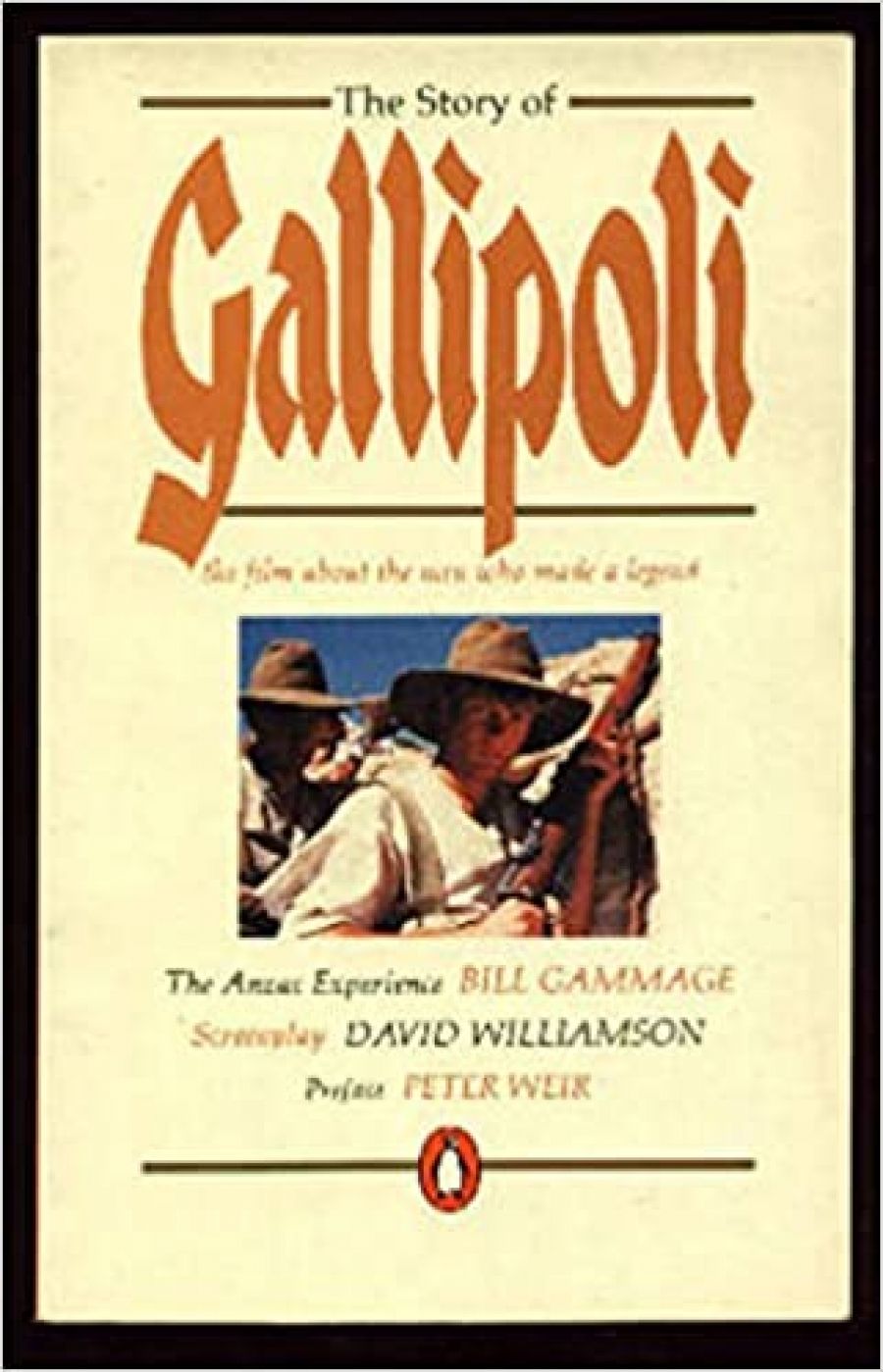
- Free Article: No
- Contents Category: Film
- Review Article: Yes
- Article Title: The Bones of Gallipoli
- Online Only: No
- Custom Highlight Text:
People tell you one week that they liked Gallipoli, but the next they’re not so sure. Gone are the days of intuitive gut felt reaction – everyone wants to make sure their judgements are intellectually sound. They read every ‘expert’ on the subject and come back with another opinion. Reading the script gives you another variation. The skeleton is there, warts and all.
- Book 1 Title: The Story of Gallipoli
- Book 1 Biblio: Penguin, $3.95, 158 pp
In the preface to this book, Peter Weir writes what I have heard David Williamson state more emphatically: ‘It wasn’t until we stopped trying to penetrate the myth that things began to fall into place. Our story became more about the journey than the destination, about people rather than events.’
Bill Gammage takes this a step further when he writes: ‘[there is] a distinction inherent in all historical writing, between stating the facts, which in film becomes the documentary, and recreating what it was like to be there which in film becomes the historical romance or epic’.
The script opens on a scene inherently compassionate, where the older generation is teaching the younger generation what it is to have guts. But like so many of the encounters between people in Gallipoli, it is fraught with conflict and in some ways conveys the age-old condition of one generation trying to incarcerate another.
In some ways it is reminiscent of Hamlet, a parallel that occurred to me occasionally throughout the film – in terms not of art, but of substance.
When the script moves on to Archy and his black mate Zac, some critics were heard to cry ‘cliché’. But in a country where ninety per cent of whites have yet to say one word to a black, and where most films have portrayed Aboriginal people as exotic beings, it seems hardly fair.
The scenes that follow are fresh in idiosyncrasy as the characters speak out in the idiom of their times. For instance, Snowy says to Frank: ‘Well, I’m not scared to die for my country, Frank’, and Frank replies, ‘Well, good for you, Snow. You go and sign yourself on.’
There are other gems in the script, such as Frank’s encounter with a waitress in a cafe out in the never-never, the beach landing by the troops at Anzac, Major Barton’s lonely soliloquy in his tent on the beach, the venereal diseases drill given to the troops, the British stiff-upper-lip brigade, and the trench notes the men left to their families and lovers before going up over the top to sudden death.
One of the scenes that lingers is the desert sequence in Western Australia when Frank and Archy set out like Burke and Wills, after the irony of Billy’s ‘black’ humour: ‘If the snakes don’t get you, the blackfellers will’. When Frank drops to the desert exhausted, we think Archy is coming back to get him up, but he is only after the water bottle. Frank’s collapse comes just after they are debating the nature of war and Frank has said to Archy’s horror: ‘It’s an English war – it’s got nothing to do with us.’ It’s one of the most marvellously surreal scenes in the whole film, complete with a camel and old derelict driver – but some people, caught forever in the Hollywood mould, have found it unrealistic.
There are, of course, holes in the script. You wonder about Archy carrying a case of books to Perth when he never utters a syllable from them to anyone, and the scene at the Egyptian bazaar comes up too like a Bazza McKenzie romp and temporarily takes you out of the film. The script nevertheless reminds me that life is a series of absurdities, where the joys and the tragedies follow one another relentlessly. People are inane, silly, generous, ugly, cowardly, wise, brave, and beautiful. No one is consistent.
Gallipoli captures all this much more than the trumped-up British Chariots of Fire which has some Australians falling in the aisles. The paradox of Gallipoli is that it shows Australians not taking themselves seriously, and so we take them very seriously indeed. Chariots of Fire, in contrast, takes itself very seriously. Abrahams, with a chip on his shoulder, is never concerned with the hypocrisy of the whole system as Frank is. He is only concerned with making it within the corridors of power which are closed to him. He learns that to be an ‘English gentleman’ is much more complex than he believed. But all the manoeuvring takes place within the élite – there is never any suggestion of a world out there beyond, or of class antagonisms.
The enthusiastic Australian reaction to this film seems all the more ironic, as we push towards a republican status in the wake of 1975, and in the light of the anti-imperialist statements of Gallipoli and Breaker Morant.
Perhaps a mistake was made by Peter Weir in calling his film Gallipoli. Americans have not been able to get their tongue around the word, and it has caused endless articles in the Australian media about its accuracy. Gallipoli, as Newsweek saw, stands as a film against wars, and it is there it makes its mark. If you’re still not sure where you stand, read this book.


Comments powered by CComment